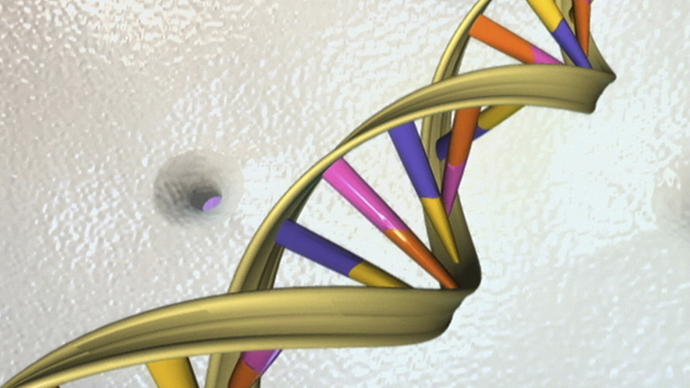Got genes: Obama proposes genetic biobank of 1mn Americans’ DNA to fight disease

A new $215 million US government proposal would seek more than 1 million American volunteers for analysis of their genetic information in an initiative to fight disease, while developing targeted health care based on one’s DNA.
Officials hope the biobank project, announced Friday by President Barack Obama, can merge existing genetic studies with a diverse range of new volunteers to hit 1 million participants.
"Precision medicine gives us one of the greatest opportunities for new medical breakthroughs we've ever seen," Obama said Friday, adding that it would "lay a foundation for a new era of life-saving discoveries."
For the immediate future, the stated goal of the project is to fight disease, especially cancer, Dr. Francis Collins, director of the National Institutes of Health (NIH), said at a news conference Thursday, Reuters reported.
READ MORE: Most cancer cases pure bad luck, not preventable – study
Volunteers, he said, have "an opportunity to take part in something historic.”
In the long run, Collins said the initiative would help with individualized health care.
How the US government will ensure that individual genetic information is kept private will certainly become a point of concern for many. A government-led database system amassing genetic coding will likely face resistance in this age of a global spying regime run by the US National Security Agency (NSA) and a genetic patent system used by the likes of Monsanto to consolidate legal ownership of the natural world.
For now, President Obama has proposed $215 million of his 2016 budget for the project: $130 million would go to the NIH for research; $70 million to NIH's National Cancer Institute to study molecular triggers of cancer for eventual drug production; $10 million to the US Food and Drug Administration to construct regulatory guidelines; and $5 million to the Office of the National Coordinator for Health Information Technology to protect private data.
"I’m very excited about this. I hope you are too" says Obama of his "precision medicine" initiative-1M DNA samples pic.twitter.com/HikPnvMKtW
— 'Lainey (@USAPatriotChick) January 30, 2015
The US Congress has signaled support for the biobank project, according to Science magazine, but it would still have to approve Obama’s funding proposal.
That level of funding for the DNA analysis project is not enough to gather 1 million original participants, as whole-genome sequencing costs about $1,000 per genome, Collins said.
He added that the government’s pool of volunteers would add to existing participants in genomic research such as the US Department of Veterans Affairs’ Million Veteran Program. Started in 2011, that project, which seeks to boost individualized care for veterans, has sequenced the DNA of about 200,000 people with 100,000 more enrolled.
Academic institutions have also gathered and analyzed hundreds of thousands of genomes with the aid of NIH funding, and private companies have worked together to collect DNA information.
For example, Regeneron Pharmaceuticals and Geisinger Health System teamed up in 2014 to sequence DNA of of 100,000 Geisinger patients. Using their anonymous health records, the companies then monitored for correlations between genetic makeup and disease.
READ MORE: Brain evolution prompted by complex, rich environments – study
Yet Craig Venter, head of the nonprofit Human Longevity Inc, pointed out that "we can't just mingle databases. It sounds like a naive assumption" if the US government believes it can easily mix information from various sources.
Human Longevity is in the process of sequencing 1 million genomes by 2020. The privately-funded efforts will then be handed over to partnering pharmaceutical companies for drug development.
"We're happy to work with them to help move the science," Venter told Reuters, despite the project’s high aspirations.
Collins said Thursday that merging databases would be a challenge, but not an insurmountable one.
"It is something that can be achieved but obviously there is a lot that needs to be done," he said.
Dr. Margaret Hamburg, the FDA's commissioner, said Thursday a new regulatory structure to accompany the development of new drugs and precision medicine "presents a set of new issues for us at FDA,” adding that the agency is in the process of working on new ways to review individualized medical procedures.
DNA mapping is an increasingly valuable tool for law enforcement as well as the health industry. In its 2013 Maryland v. King ruling, the US Supreme Court narrowly decided that the Fourth Amendment allows law enforcement to, without a warrant, collect DNA samples from arrestees even if they have not been convicted of a crime.
"Make no mistake about it,” the dissenting group of justices wrote of the majority decision. “Your DNA can be taken and entered into a national database if you are ever arrested, rightly or wrongly, and for whatever reason."











